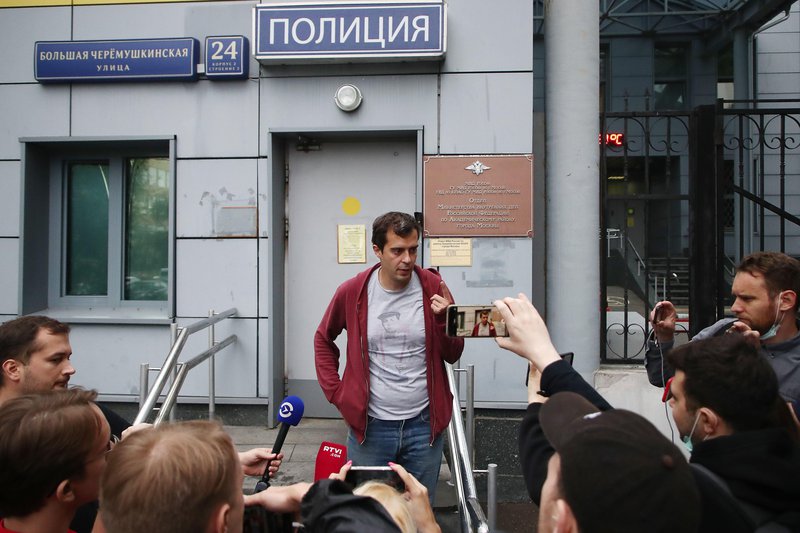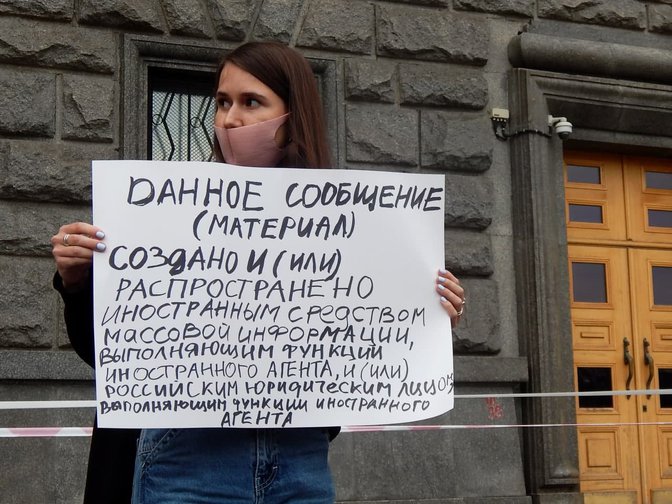Russian journalists are being labelled ‘foreign agents’. They need your support
THIS MESSAGE (MATERIAL) WAS CREATED AND/OR DISSEMINATED BY A FOREIGN MASS MEDIA OUTLET PERFORMING THE FUNCTIONS OF A FOREIGN AGENT AND (OR) A RUSSIAN LEGAL ENTITY PERFORMING THE FUNCTIONS OF A FOREIGN AGENT
Editors Of ODR-30 September 2021
The message above is what journalists at Mediazona and OVD-Info now have to place on their websites and social media feeds whenever they publish an article.
Mediazona has reported on hundreds of cases of police torture and brutality, falsified drug and political charges, and the systemic violence inside the country’s prison system. OVD-Info is a human rights media project that covers every political arrest and prosecution – there are now dozens across Russia on a weekly basis – and provides legal support to people detained at protests or just outside their homes. In the past few years, openDemocracy has translated and published dozens of articles by both outlets to highlight their importance.
On Wednesday, these outlets, as well as Mediazona’s publisher and chief editor, were declared ‘foreign agents’ by the Russian Ministry of Justice. Staff working for Golos, the election monitor, were also put on the ‘foreign agent’ list.
They are not the first.
The effects of Russia’s ‘foreign agent’ legislation against media and civil society are direct and deeply troubling. In effect, the ‘foreign agent’ label marks a media outlet as undesirable to sources, advertisers, supporters and readers. They are, in effect, deemed ‘enemies of the people’, to use the Soviet term – and this makes the day-to-day work of journalists incredibly difficult.
Meduza, an independent organisation specialising in hard-hitting investigations and feature writing, was in May added to the ‘foreign agent’ list, and has since reported the loss of advertising revenue, which in turn has meant the loss of high-quality journalists. VTimes, which came from the ashes of high-quality business daily Vedomosti, decided to close down completely that same month after also being added to the list.
The urgent issues that concern Russian citizens – law and justice, socio-economic rights, democracy – are not to be reported on with detail, care and independence. Instead, attempts to do so independently are to be shut down and isolated under the rubric of ‘foreign influence’
But these are just two examples. The Ministry of Justice has now declared more than 20 media ‘foreign agents’, and it is clearly not slowing down. While there were hopes that the targeting of independent media in the summer would ease off after the parliamentary elections this month, it seems clear that the Russian authorities want to clear the field of independent media.
This means the urgent issues that concern Russian citizens – law and justice, socio-economic rights, democracy – are not to be reported on with detail, care and independence. Instead, attempts to do so independently are to be shut down and isolated under the rubric of ‘foreign influence’ – of which there is no evidence. When outlets ask for the evidence of their ‘foreign funding’, Russian prosecutors refuse to release it.
Ironically, as Sergey Smirnov, chief editor of Mediazona, pointed out after the decision, it’s the officials of Vladimir Putin’s United Russia party and their elite supporters who are the ones with property, cash and assets in the West – yet it’s the media and civil society people who continue working in Russia who are ‘foreign agents’.
Sadly, it’s not possible for everyone to continue working. This morning, it was reported that Russian security services had raided the home of Roman Dobrokhotov, chief editor of The Insider, an outlet pivotal in the investigations into the poisoning of opposition leader Alexey Navalny and other public figures. As it turned out, Dobrokhotov had apparently left Russia in August. Others, like journalist Ivan Safronov, are imprisoned for months while they face treason charges.

Russian journalists have sought to consolidate their protests and efforts in response to these constant and unpredictable threats, including pickets against the use of ‘foreign agent’ legislation and a new petition calling on the authorities to revoke it – and readers to financially support these outlets with whatever they can. One hundred and fifty thousand people have already signed.
Media workers and others outside the country can and should help spread information about the situation facing Russian colleagues. Tweet it. Facebook it. Put it on Instagram. Send it in an email.
Solidarity in this situation – where the terror never seems to end and it becomes harder and harder to get people interested – is vital.



No comments:
Post a Comment
Note: only a member of this blog may post a comment.